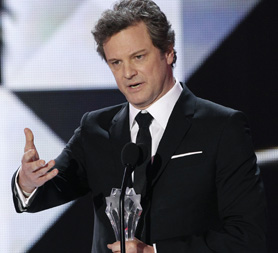Backing success in British cinema?
The King’s Speech gathers 14 nominations for next month’s Bafta awards – but does it justify the public funding it received, asks Samira Ahmed.

When I remarked on Twitter on Monday that the Golden Globe-winning, much Bafta-nominated, Oscar-hopeful The King’s Speech had been funded via the now defunct UK Film Council I was flagging up the difficulty in assessing success and failure, rather than attacking the government per se for abolishing one quango to move its functions to another body.
In making its decision the government cited how much money was spent on overheads. The government says more net funding will be available when film funding responsibilities pass to the British Film Institute. What is consistent is how just about every government for the past 50 years has tinkered with the structures of state film funding, always in pursuit of that elusive grail – great (commercially? critically?) successful films and tax or lottery-payer “value for money”. You can view all the projects the UKFC has awarded and the amounts on its website.
Eady Levy
Back in the 50s, big studios paid an Eady Levy from their then massive UK box office returns – a tax to fund British films. Like today some of the projects were worthy but dull – or frivolous – and rarely made money. It’s just we don’t remember them, and they don’t get discussed on vintage film programmes any more than we play the dross that cluttered up much of the pop charts in the 60s.
Then, starting in the 1990s, the National Lottery opened up a goldmine. You couldn’t walk to a train station or past a bus stop without seeing a poster for some new “hilarious” or worthy British movie.
Up and Under, Sex Lives of the Potato Men; there were the Trainspotting clones, the Lock, Stock and 2 Smoking Barrels gangster clones. Somewhere in there were critically acclaimed films with small returns – such as Lyn Ramsay’s Ratcatcher.
Exactly 10 years ago it emerged that only one out of 11 films released and funded through National Lottery money in three years had made a profit (An Ideal Husband).
It reminded me of Alexander Walker’s assessment of the great British films of the 60s: A Hard Day’s Night, If… Blow Up and Performance.
All but the first were not mainstream hits. What is most interesting, that all – except If… – were funded by major Hollywood studios. Performance – with hindsight a remarkably daring film – was funded by Warner Brothers. The studio was so horrified, it delayed release till 1970 and an executive was supposed to have remarked on a viewing: “Even the bathwater is dirty”.
Funding decisions
So what sort of films should a government-backed UK film body be funding? Do you need UK tax revenues to fund a movie like The King’s Speech? Isn’t that exactly the kind of film which should raise all its money privately? Or does that mean funding only worthy films that no-one wants to pay to see? In addition, is it too easy to judge with hindsight what was always going to make it big?
Like 1981’s Oscar-winning triumph, Chariots of Fire, The King’s Speech deals with difficult and engaging themes with strong actors. One tackles the trauma of stammering in a powerful man at a crucial junction in history; the other dealt with the ugly anti-semitism of upper-middle class England and the challenge to a devout Christian’s faith.
But one can’t help wondering if it’s the comfy “heritage” setting that has been the real winner. And whether the temptation in these austere times is for British film funding to do what appeared to happen in the 80s: invest in “safe” material.
The 80s was dominated by the tone set by Merchant and Ivory’s period adaptations. France, by contrast, continues to make a broader range of contemporary-set movies.
Chris Morris’s truly original and daring Four Lions, which makes disturbing – but genuine – comedy out of homegrown Islamist terrorism, seems to mine the same dark subversive terrain as the finest Ealing comedies. While nominated in other categories, it’s a notable omission from today’s BAFTA original screenplay shortlist.
In 20 years, I wonder what its status will be? Perhaps the BFI could do worse than take inspiration from the golden age of the Ealing studios in planning its funding policity. Ealing had a steady output of British material that celebrated contemporary life in all its complexity – kind hearts, NOT just coronets.




